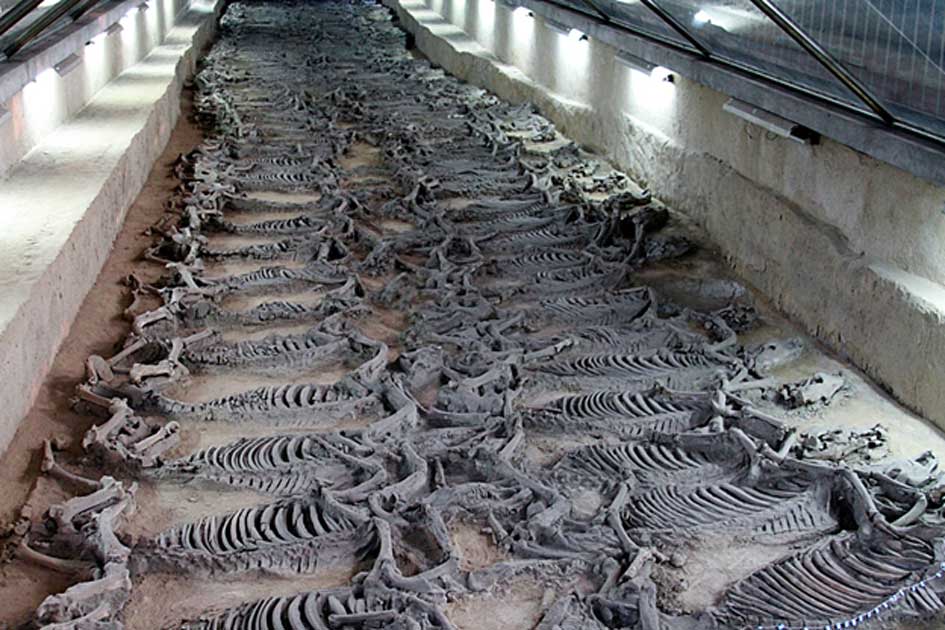A large area for animal sacrifices by Chinese emperors dating from the 3 rd century BC to the 1 st century AD in western China has been excavated and found to contain many cultural artifacts.
Called the Yongshan Blood Pool, the pits are in an area near the ancient capital of the bloody Qin Dynasty and contained wooden and bronze chariots, jade artifacts and figurines, along with evidence of large scale horse slaughter.

From Nomads to Glampers: The History of the Yurt
So far, Chinese archaeologists have excavated just 2,000 square meters (21,528 square feet) of the large site in Shaanxi Province at Fengshiang, ending initial explorations in November.
The Yongshan Blood Pool site is believed to have been a place of animal sacrifice for emperors of the violent Qin Dynasty, which last from just 221 to 206 BC. Researchers think Western Han Dynasty emperors sacrificed horses there. The Western Han lasted from 204 BC to 24 AD. The Qin state lasted longer than the dynasty of the same name, being extant from 700 to 221 BC, Chinanews.cn says .

Some of the cultural relics found when Chinese state archaeologists excavated the site, called Yongshan Blood Pool.
“The excavation completed a wider archaeological survey of this large ancient site, which had a total area of 4.7 million square meters, and produced important findings, with the confirmation of more than 3,200 related sites, including buildings, facilities, roads and sacrificial pits,” Tian Yaqi, a researcher with the institute and chief of the archaeological team undertaking the excavation, told Chinanews.cn.
“The excavation focused on a rammed earth platform and sacrificial pits, two site ruins with different characters, and it is the first time we have found such imperial sacrificial sites, which are identical with ancient records,” Tian said.

A wooden chariot suggest there was animal sacrifice at the Yongshan Blood Pool site in Fengxiang, Shaanxi province.
Liu Qingzhu of the Chinese Academy of Social Sciences and former director of its Institute of Archaeology told China News that the artifacts, which also include figurines, tiles and other relics, helped experts more accurately determine the nature and antiquity of the site.
“Sacrificial offerings have been one of the core values of civilizations worldwide, but such large-scale sacrificial ceremonies were only seen in Chinese civilization,” Liu told China News.
One of the most famous examples of large scale horse sacrifice in China can be seen at the 6 th century BC tomb site of Duke Jing of Qi , who was buried in a huge complex along with the remains of more than 600 horses.
Daoism would have been one of the primary religions of both the Qin and Han dynasties. An interesting article about Daoism’s ethics with regard to the treatment of animals by Louis Komjathy, states that according to an early Daoist text, the Zhuanzhi, animals held a special place in China and were not suitable for sacrifice. The principles set forth in Mr. Komjathy’s article on Daoism seem to contradict the apparent practice of animal sacrifice at the recently excavated imperial site.

A crossbow mechanism from the site
However, Confucianism also existed in China at the time. According to Herbert Plutschow , in 2008 dean of International Humanities at Josai University in Japan:
Confucianism, a socio-political philosophy based on etiquette, ritual know-how, and learning made human sacrifice obsolete, as the state no longer needed blood sacrifice to impose political authority and social cohesion. Animal sacrifice, however, continued as an important imperial ritual until the collapse of imperial China in 1911.
Another article online , from ChinaHighlights.com, tells of the bloody legacy of the Qin Dynasty, saying those emperors’ wars greatly reduced China’s population and destroyed much culture and scholarship from the Zhou era. So maybe it isn’t so surprising if those particular Qin rulers negated the precepts of Daoism with respect to animals.
Src: ancient-origins.net





